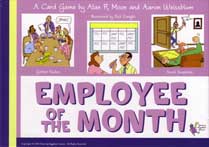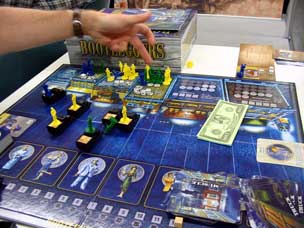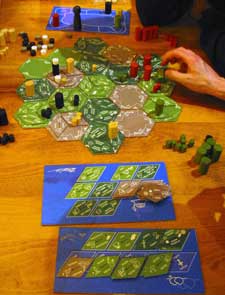Argentum VerlagA new publisher based in Cologne, Argentum Verlag had three new games for us to see. The one I’ve played is Metallurgie, a clever tactical card game designed by Maik Hennebach. The theme is alchemy: converting base iron to gold (via copper and silver). Players lay cards (of the four metals) on the table in an interlocking pattern. They score points by getting a big enough contiguous group of one metal. Then they take some cards off the table again – potentially revealing a group of a different metal and scoring again. Not a game for those who struggle with spatial awareness, but otherwise quite rewarding. The second game is Garten-Zwerge eV (The Garden Gnomes Society) by Roman Mathar. This is a card game of bidding and bluff as players try to breed a " golden-capped garden gnome" (I kid you not!). It sounds so silly I really want to play it! The third game sounds equally bonkers: UFOs! Fritten aus dem All (UFOs! Fries from Space) by company boss Petra Brandenburger. Apparently the idea is that aliens are trying to take over the Earth. By setting up fast food chains! That explains a lot… Bambus SpieleverlagThere were two new games from Bambus, though I didn’t get to play either. The first was Capt'n W Kidd by Volker Schäfer, a tactical manoeuvring game and one of the many pirate-themed games at this year’s Spiel. The second was Chinagold by Günter Cornett, a two-player game themed around prospecting for gold. BeWitched SpieleAndrea Meyer’s imprint had her new game, Große Geschäfte (literally " Big Business" , but called Mall World in its English incarnation from Rio Grande). The game is about developing a shopping mall in the middle of nowhere. Players take money from retailers to get their shops into the mall, while trying to achieve their own goals. The game is fairly complex and one I look forward to trying out soon. Clemens GerhardsClemens Gerhards is one of a number of German companies that produce terrific-looking wooden games. These creations are as much coffee-table objets as games. This year’s new titles were:
Clicker SpieleClicker Spiele is a new name to me – it appears to be the imprint for designer Stephan Riedel. For this year’s Spiel he had a new edition of Old Town, which has appeared in slightly different forms before. Old Town is like a board game version of those puzzles where you have to deduce the relationship from some apparently unrelated facts. In this case it’s deciding where particular buildings were on the plan of a long-vanished Wild West town. The players have cards that give clues as to the location of a specific building (" The Saloon was north of the railroad" , for example) or of one of the player’s current buildings (" my building was on Main street" ). As further cards are played, the possible locations reduce – scoring points for players – until there’s only one place for a building. The game’s over when the town plan is full, though not all the buildings will be played. The scoring system is rather clever. In effect, it means players will generally be able to score a few points on early turns and a few points each turn in the end game. In the middle of the game, there are occasional opportunities to make a killing. Spot one of these and you’re well away. This is a clever, quick-playing game that offers quite a challenge. CwaliCorné van Moorsel had two new games for us this year, though I didn’t get to try either. SeaSim is a two-player game of predatory fish. This is nicely produced with a board full of wooden fish, but it’s not my kettle of fish. (Sorry.) Typo is a word game played with letter cards. What makes it different is that players chose their cards secretly, reveal them and then play in alphabetical order. Cards are added to what’s on the table, but must make something pronounceable. It sounds like a neat twist on traditional word games and should be multilingual. Damm EgmontA new publisher from Norway brings us Mytteriet på Little Blue (Mutiny on the Little Blue) by Kristian Østby. The players are all pirates on the Little Blue, which is sailing round the Caribbean digging up treasure. Unfortunately the Captain is showing his age and finds it hard to distinguish the other crewmembers. So players negotiate with the Captain to be the one who goes ashore with him at each island. The treasure the two of them collect will depend on who that crewmember really is – unless they’re a mutineer, in which case they take over as Captain. This is a pure negotiation game that is undemanding fun to play. Dancing Eggplant GamesUS publisher Dancing Eggplant Games (formerly Diet Evil Games, but that’s not important right now) had the latest in their range of fun card games on show. This is Employee of the Month, designed by Alan R Moon and Aaron Weissblum. The idea of this is that, each turn, players bid for a pair of cards, one showing Brownie or Kudos points, the other Suspicions. The bidding is by taking one of the Favour cards on display (either Boss Favours – such as working late – or Workmate Favours – like buying the drinks). The game is scored when all the cards have been used. Whoever has the most Boss Favours is regarded with suspicion by their Workmates, and whoever’s got the most Workmate Favours attracts the Boss’s suspicions. These players (and it might be the same person) count their Suspicion cards as penalty points. Conversely, the player/s with the fewest of each type of Favour count their Kudos as positive points and everybody counts Brownie points. This is a very neat little game. There may not be much to it, but it bounces along very quickly, players have decisions to make and there are some tactical subtleties. The Dancing Eggplants were also handling the stand for their compatriots, Jolly Roger Games. This included another new card game from Moon and Weissblum: Clocktowers. This game has the players building clocktowers by laying lines of cards up the table. The idea is to get them the correct length with the right roof on and avoid letting mice and cats get in. It’s another quick-playing game that sounds quite fun. DaVinci GamesDaVinci Games had a lot of new titles on display, with more to come. One was Dodge City, an expansion for Bang!. This adds some new characters and extra cards to the game and allows it to be played by 3 or 8 players. Dancing Dice (by Silvano Sorrentino) is a quick dice game themed around dance marathons. Players roll their dice and arrange them into ‘dance sequences’, aiming to get better sequences than their opponents – or a sequence that confers a special power. Gradual elimination will leave one winner. It sounds like fun! Ostrakon is a card game, also by Silvano Sorrentino. This is more of a party game. The cards give questions and themes which players must respond to. The other players then vote on whether their response was good enough or whether to ‘ostracise’ them. Aimed at a younger audience is Tuchulcha by Marco Donadoni. While the theme is about Ancient Etruscans sacrificing to their Gods, the game is essentially a Ludo variant. Mayfair Games is publishing an English language edition. Word Jam is an interesting variant on word games from Walter Obert. In this one, the letter cards are consonants only. A selection of letters is laid out, each worth a different value. Players then try to make a high-scoring word incorporating these letters. The first to come up with something has the initiative: the others decide whether to back that player or try to find something better. Depending on how this works out, players score points. After eight rounds the highest total wins. This sounds like a clever game and should work in most European languages. DaVinci has teamed up with Mayfair Games to produce English language editions of their games. As noted above, Tuchulcha is included in this, as are Dancing Dice, Word Jam and other, older daVinci titles. Days of WonderUS company Days of Wonder had a substantial stand to celebrate their Spiel des Jahres winner, Ticket to Ride. A small expansion to the game (some extra Tickets and scoring options), called Mystery Train, was given away on the stand. Head honcho Mark Kaufman promised a European version (that is, with a map of Europe for the board) for next year. Eagle Games
The aim is to accumulate the most cash over a set number of turns. But the key to the game is getting ‘influence’ (those mobster figures) into the different speakeasies. A player without influence can’t sell, while having a majority gets you a rake-off on sales. Cue mob wars! And Jimmy Cagney impressions. With a nice bidding mechanism at the start of each turn, the game repays a bit of thought as well as being fun to play. Eggertspiele
The second game on the Eggertspiele stand was Power-Soccer by Fritz Behrens. This is a football game played with a pair of special dice. The football theme was enough to make sure I gave it a wide berth! Face 2 Face GamesFace 2 Face Games is another US publisher making an impression in Europe. (The company was in my good books right from the start by publishing a new edition of I’m the Boss.) Boomtown was designed by Bruno Cathala and Bruno Faidutti and is a card game about the Gold Rush. Players bid to gain mining concessions. They try to get majorities in the towns (as being Mayor of a town gives some advantages) and to make sure their mines produce something. The aim is to have the most money at the end of the game. The game has some very clever features – such as the distribution of the money paid for a mine between the players. It is quite fun to play and careful play deals with the random elements. Also billed as a Face 2 Face game was Warriors by Richard Borg and Alan Moon. This turned out to be the English language edition of Phalanx’s Monster & Mythen, which is due out in January 2005. Also expected was Joe Huber’s Ice Cream, but production problems meant that it was not ready in time for Spiel. It’s now expected in January 2005. Click here for the next page of my Spiel '04 report Top of page / Page 1 /Page 3 / Page 4 / Reviews index Page created 21st February 2005. Last modified 24th June 2005. This website produced by Paul Evans. © Copyright Paul Evans, 2005. All trademarks acknowledged. Problems, comments and feedback to Webmaster@pevans.co.uk. |
Pevans |

 Eagle Games is best known for big
board games (think Axis & Allies) with hundreds of
pieces. Bootleggers, they tell us, is a hybrid between the
‘German’ and ‘American’ styles of game design, though the
designers are all American: Steve Gross, Don Beyer and Ray
Eifler. The story is that the players are all mob bosses,
competing to produce bootleg whisky and sell it to Chicago
speakeasies. The whisky is wooden cubes and players stack their
whisky in model trucks to deliver it. Add in the plastic mobster
figures in different colours and the atmospheric artwork and you
have a good-looking game.
Eagle Games is best known for big
board games (think Axis & Allies) with hundreds of
pieces. Bootleggers, they tell us, is a hybrid between the
‘German’ and ‘American’ styles of game design, though the
designers are all American: Steve Gross, Don Beyer and Ray
Eifler. The story is that the players are all mob bosses,
competing to produce bootleg whisky and sell it to Chicago
speakeasies. The whisky is wooden cubes and players stack their
whisky in model trucks to deliver it. Add in the plastic mobster
figures in different colours and the atmospheric artwork and you
have a good-looking game.
 One of the big buzzes early on in
the show was about Neuland, designed by Tobias Stapelfeldt
and Peter Eggert and published by Eggertspiele. The game is about
the development of the eponymous new land, starting as virgin
forest, fields and mountains. Players build buildings to produce
materials to build more buildings to produce more materials. At
the end of this sequence of production are the various cultural
advances that score victory points. With limited actions each
turn, players have to plan carefully to produce what they need –
or use goods stored from the previous turn. I thought this
sounded like my kind of game and was impressed when I got to play
it. A full review is in progress.
One of the big buzzes early on in
the show was about Neuland, designed by Tobias Stapelfeldt
and Peter Eggert and published by Eggertspiele. The game is about
the development of the eponymous new land, starting as virgin
forest, fields and mountains. Players build buildings to produce
materials to build more buildings to produce more materials. At
the end of this sequence of production are the various cultural
advances that score victory points. With limited actions each
turn, players have to plan carefully to produce what they need –
or use goods stored from the previous turn. I thought this
sounded like my kind of game and was impressed when I got to play
it. A full review is in progress.